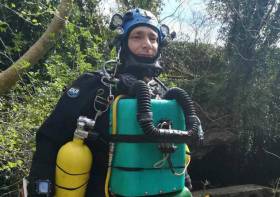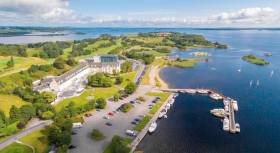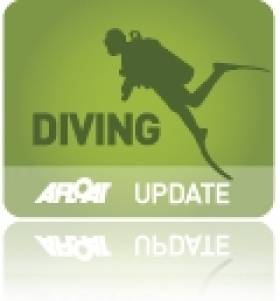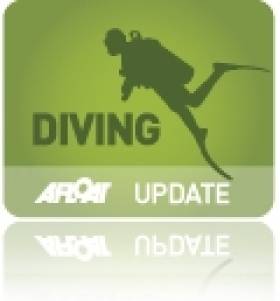Displaying items by tag: Dive Ireland
Dive Ireland Expo 2024 Takes Place This Weekend
The annual Dive Ireland Expo is running this weekend at the Sport Ireland Campus near Blanchardstown in West Dublin.
Organisers at Viking Sub Aqua Club promise “the biggest dive show ever”, with SCUBA diving featured along with snorkelling, free diving and other watersports from paddle boarding to sea swimming and even ocean photography.
The weekend also welcomes a host of guest speakers, with Sunday’s bill including award-winning underwater photographer George Karbus and film-maker Ken O’Sullivan.
Tickets and more are available at DiveIreland.ie.
#Diving - This year’s Dive Ireland International Expo opens tomorrow (Saturday 2 March) at the Great National Abbey Court Hotel in Nenagh.
Hosted by the Lough Derg Sub Aqua Club in association with the Irish Underwater Council, the two-day event will as ever feature a wide array of diving exhibitors, traders and speakers, as the Nenagh Guardian reports.
Star among them will be Clare-based cave diver Jim Warny, just months after his key role in the dramatic rescue of a youth football team from a flooded Thai cavern network.
Recently Warny was a guest at the Pendulum summit in Dublin where he downplayed his heroism, describing himself as “just a person with a specific skill”.
Speakers Announced For Dive Ireland 2017
#Diving - A number of main stage speakers have been announced for Dive Ireland 2017 at Athlone’s Hodson Bay Hotel from 4-5 March.
Marine salvage specialist Brian McAllister will talk the challenges of raising the Costa Concordia off the coast of Italy, a pioneering effort that involved the greatest minds and hands in the industry.
Renowned wreck diver Barry McGill discusses the struggle to control pivotal shipping waters in the North Atlantic off the Irish coast during the First World War by the use of U-boats and mines.
On a similar war theme, Irish-born but France-based diver and photographer Catherine Connors surveys the remains of the Second World War’s Operation Overlord, better known at the D-Day landings.
Closer to home, Tosh Lavery gives a brief history of the Garda Underwater Unit and its work on missing person and murder cases alike.
The Dive Ireland International Expo is the event of the year for all underwater enthusiasts, featuring two days of talks, trading and networking on Lough Ree that also includes the AGM of the Irish Underwater Council (CFT) on Sunday 5 March.
More details are available from DiveIreland.ie
Dive Ireland 2013 Is 'Huge Success'
#Diving - The Irish Underwater Council (CFT) reports the "huge success" of the 22nd annual Dive Ireland expo in Athlone at the weekend.
The two-day event at the Hodson Bay Hotel welcomed "speakers from near and far as well as photography workshops and a fully loaded international trade fair" - not to mention the CFT National Dive Conference and AGM.
Ahead of the expo, Minister for Arts, Heritage and the Gaeltacht Jimmy Deenihan commented on the role of SCUBA clubs and diving centres in Ireland's national tourism infrastructure in promoting this country's dive sites.
In the foreword to the recently published Warships, U-boats and Liners, he also wrote of the Government's commitment to developing its archive of wrecks in Irish waters.
“With the support of responsible dive centres and local dive clubs ... these wrecks can be explored now and into the distant future by visitors from home and abroad.”
According to the CFT, local authorities are also starting to recognise the importance of developing aquatic activities to encourage tourism.
One example is Mayo County Council's Blue Ways list of swimming and snorkelling sites along the county's coast, which complements its Green Ways walking trails.
The council also highlighted the importance of heritage among Ireland's diving community, and their role in discoveries such as the Viking-era swords retrieved from the River Shannon near Banagher last autumn, as the Offaly Independent reports.
Dive Ireland Expo Returns To Athlone For 2013
#Diving - The Dive Ireland expo heads to Athlone in 2013 with a full weekend of speakers, exhibits and workshops for divers and snorkelers of all levels.
This year's hosts at the Athlone Sub Aqua Club have announced details of the 22nd-annual dive show from 2-3 March 2013 at the Hodson Bay Hotel, which also doubles as the AGM for the Irish Underwater Council (CFT).
Speakers lined up for this year include renowned wreck diver Barry McGill, cave divers Jim Warney and Jason Masterson, limit-pushing free diver Feargus Callaghy and snorkelling advocate Victor Kutischev, as well as representatives from marine wildlife conservation group Sea Shepherd.
Just like last year, Dive Ireland 2013 will also feature a wide array of exhibitors to cater for all types of diver interests - and entry for each day costs just €5.
The Athlone Sub Aqua Club has more details on the Dive Ireland 2013 programme HERE.
































































